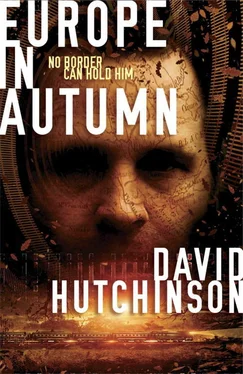“I think you should ask someone else to do this thing for you,” he mumbled, starting to stand up.
The Balt didn’t move. “The last person I showed that poem to told me he’d need at least two hours and access to all kinds of tables and reference books,” he said.
Lev shrugged, hardly even surprised not to have been first choice. “ Classicists ,” he said.
“You decrypted it in twenty minutes with a paper napkin and an eyebrow pencil. I think you’re exactly the person I’ve been looking for.” When Lev remained standing, the Balt said, “A hundred thousand Swiss francs, in any currency you choose, in any bank account you choose, anywhere in the world. Half now, half when you’re finished.”
Lev sat down, eyes brimming with tears, knowing how close he was to doing it for the price of a couple of drinks. “It’s been…” He sniffed and rubbed his eyes. “It’s been a long time. I may not be able to help you.”
“Perhaps a consulting fee, then,” said the Balt. “Paid daily. Perhaps that would be fairer.”
Lev nodded. “I would prefer that.”
“Before we begin, I should warn you that there may be some danger.”
“Danger?”
For the first time, the Balt looked fractionally uncomfortable. “I don’t know how, or why, but there may be some danger. But that’s my problem and I’ll do my best to protect you while you work, and afterward.” He blinked at Lev. “If you were to get up and leave right now, I wouldn’t hold it against you.”
Lev did think about it. For almost a second. He waved a hand, inheritor of the Cheka, the NKVD, the KGB, child of Enigma and Kolossal. “I no longer have anything to be afraid of,” he said, and cringed inwardly. Such a Russian thing to say.
The Balt looked sad. “Well, let’s hope this doesn’t turn out to be a learning experience for you. Is there anything you will need?”
Lev looked at him, wondering how his life had suddenly taken such a turn. “I will need to retrieve my laptop from Mr Keoshgerian,” he said.
LEV’S LAPTOP WAS made entirely of cloth. It looked like something from a fabric conditioner commercial. The tapboard resembled an alphanumeric embroidery sampler, and the printer/scanner/copier could have been mistaken for a brightly-coloured hand towel. All rolled up and stuffed into a small drawstring bag, it looked like one of those little cushions people buy to rest their heads on during long coach journeys. Rudi had never seen anything like it before.
“We did magic, once upon a time,” Lev said with a ghost of pride. “And we never told anyone.”
“How does it work?” Rudi asked, thinking about the patents involved.
Lev shrugged. “Don’t know. You just plug one end into an electrical socket, the other end into an entertainment set, and it works. You can even wash it, but if the water’s too hot it destroys the memory and processor threads, and then all you’ve got is some bits of rug. We’ll need to buy cables for it. And an external hard drive. A big hard drive.”
“Not a problem.”
Lev ran his fingers over the woven surfaces. “I never could bear to sell it. Pawn it now and again, perhaps, but never sell it. I did think once I’d take it to one of the hardware houses, sell them the technology. But my former employers would have heard about it, and they would have sent someone to kill me. Someone like you.”
Rudi looked at the little Russian. They would have sent someone to kill me . Lev didn’t sound sad or angry, just rather matter-of-fact, like a father who has just caught the weather forecast and discovered that the family picnic is going to be rained off. And what was that someone like you all about?
“Do you need a drink?” he asked.
Lev shook his head. “I need to work.”
Rudi didn’t think that Lev needed to worry about his former employers. The last time he had been in Russia – European Russia, this was, what they were just beginning to call Rus back then – the local intelligence services hadn’t been anything to phone home about.
RUDI HAD A room in one of the swanky hotels in the New Town, so Lev moved his few belongings – some books, an old iPod, a bag of clothes – in there, and after the formalities were over and he had some money in his pocket, Lev sat down and set up the cloth laptop. When it was ready he said, “Show me this thing that no one else can decrypt.”
Rudi took from behind the sofa a heavy-looking attaché case and opened it by swiping a cardkey down its side and then typing in a long combination on the lockpad on top. He took out a rolled-up paper map and two old-looking books, one thick with battered cardboard covers, the other a thin leather-bound notebook.
“In case you need some background,” he said, handing over the notebook, “the map’s of the Line. Standard stuff you can buy anywhere. This,” holding up the thick book, “is a 1912 railway timetable for the South of England. And I have no idea what any of it means.”
Lev took the notebook and opened it. Tucked inside the cover were five sheets of paper covered with printed columns of numbers and letters. No, not printed… Lev ran his fingertip over the back of one of the sheets, felt the slight embossing of the typewriter. These sheets had been typed a very long time ago.
He laid them aside and paged through the notebook. More columns of numbers and letters, closely written in ink, in a clear, careful hand. He checked inside the front and back covers and both endpapers, but there were no pencil jottings, no idle calculations that might give a clue to the cypher being used.
“This may take a little while,” he said.
Rudi shrugged and limped over to examine the room’s minibar. “If it takes a while, it takes a while, Professor. I know these things mustn’t be rushed.”
Lev shrugged. He unrolled the laptop and scanner, plugged in the newly-purchased hard drive, and began the process of booting everything together.
OF PARTICULAR INTEREST to cartographical students, Sheet 2000 – the so-called ‘Millennial Sheet’ – is the only surviving sheet produced by the ‘Alternative Survey’ begun by General H. Whitton-Whyte in 1770.
THE ALTERNATIVE SURVEY
Quite why General Whitton-Whyte undertook his own survey of the British Isles, when the same work was being carried out by the Ordnance Survey, is not known.
Indeed, much of the history of the family is shrouded in mystery. Very little remains to us of the early history of the Whitton-Whytes. In Bryce’s Great Families Of The County Of Staffordshire (Angel and Pediment, 1887), the family merits only a footnote appended to an entry concerning the Bracewells of Leek. In the 1888 edition of the book this footnote mentions a rumour extant in the county over a century before that the Whitton-Whytes had ‘fallen upon hard times due to an illness’ which forced them to sell their house, Whetstones, to the Bracewell family, and move to London. The footnote is omitted from later editions of Bryce.
In Seichais’ Cartographie Anglaises (Spurrier, 1901), Whitton-Whyte is included mainly because of his ‘eccentric system of numbering sheets,’ sheets apparently being given the first number which entered the General’s head on the day of publication. Some of these numbers ran to many digits (forty-seven in the case of the Birmingham sheet) and abridged numbers – so-called ‘Whyte Numbers’ – were later appended to the sheets for ease of cataloguing.
Of the Survey itself, details are only available of the later stages. Apocryphal stories abound of Whitton-Whyte’s wild-haired figure tramping the Western Isles of Scotland or the Yorkshire Dales, theodolite in hand and – in the early days of the Survey at any rate – attended by a small army of helpers drawn from his lost estates in Staffordshire.
Читать дальше







